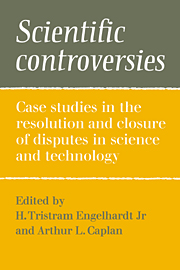 Scientific Controversies
Scientific Controversies Book contents
- Frontmatter
- Contents
- Preface
- List of contributors
- Introduction: Patterns of controversy and closure: the interplay of knowledge, values, and political forces
- PART I THEORETICAL PERSPECTIVES
- 1 Ethical theory and the problem of closure
- 2 Scientific controversy and its termination
- 3 The political anatomy of controversy in the sciences
- 4 Controversies involving science and technology: a theoretical perspective
- 5 Politics, public policy-making, and the process of reaching closure
- 6 The role of experts in scientific controversy
- 7 The continental drift debate
- 8 How history and politics affect closure in biomedical discussions: the example of the Soviet Union
- 9 Scientific disputes over policy
- 10 Controversies and the authority of science
- 11 Post-Skinner and post-Freud: philosophical causes of scientific disagreements
- PART II CONTEMPORARY CASE STUDIES
- PART III CONTROVERSY, CLOSURE, AND THE PUBLIC
- Author index
- Subject index
4 - Controversies involving science and technology: a theoretical perspective
Published online by Cambridge University Press: 03 February 2010
- Frontmatter
- Contents
- Preface
- List of contributors
- Introduction: Patterns of controversy and closure: the interplay of knowledge, values, and political forces
- PART I THEORETICAL PERSPECTIVES
- 1 Ethical theory and the problem of closure
- 2 Scientific controversy and its termination
- 3 The political anatomy of controversy in the sciences
- 4 Controversies involving science and technology: a theoretical perspective
- 5 Politics, public policy-making, and the process of reaching closure
- 6 The role of experts in scientific controversy
- 7 The continental drift debate
- 8 How history and politics affect closure in biomedical discussions: the example of the Soviet Union
- 9 Scientific disputes over policy
- 10 Controversies and the authority of science
- 11 Post-Skinner and post-Freud: philosophical causes of scientific disagreements
- PART II CONTEMPORARY CASE STUDIES
- PART III CONTROVERSY, CLOSURE, AND THE PUBLIC
- Author index
- Subject index
Summary
Why study controversy?
Widespread public controversies involving science and technology have been a prominent feature of American public life since World War II. At first these controversies were concerned mainly with military technology: fallout, the test ban treaty, the antiballistic missile. More recently, controversies have developed over civilian technology (nuclear power, the supersonic transport) and even over the conduct of scientific research itself (race and IQ, molecular biology). These controversies have contributed substantially to public awareness of the increasing role of science and technology in modern societies and have quite naturally become the subject of scholarly research. Indeed, case studies of particular controversies provide an important part of the literature of the new academic field of “Science, Technology and Society” (or “Science and Technology Studies”). After a decade of such research, it is important to reconsider the question. Why study controversy?
One motivation for such case studies is fairly clear. It is obvious that science and technology interact with other components of society in many important ways, but the nature of these interactions is elusive. However, the points of interaction tend to be obvious in the context of specific controversies. Moreover, the record is mostly public and easily accessible. Major controversies, then, can be regarded as a microcosm in which the interactions between science or technology and the rest of society can conveniently be observed and studied.
Although the literature is dominated by case studies, there have recently been several attempts to move beyond the particular cases toward more general accounts of the nature and dynamics of controversies involving science and technology.
- Type
- Chapter
- Information
- Scientific ControversiesCase Studies in the Resolution and Closure of Disputes in Science and Technology, pp. 125 - 150Publisher: Cambridge University PressPrint publication year: 1987
- 3
- Cited by


